
Source: Declaration of Independence, National Archives, Our Documents
The tension between the American colonists and the English government grew until it was clear that the relationship between the two could not be repaired. The colonists felt the policies that were imposed by the king denied them political rights and individual freedom. The colonists believed they were entitled to the right of representation and political independence and a host of other rights and freedoms. Eventually, the colonists made the bold choice to declare their independence from England. The colonists had gone so far as to assemble the First Continental Congress, with delegates from all but one of the colonies, in response to the Intolerable Acts. The delegates discussed the problems they faced and tried to find a solution by petitioning the king.
The First Continental Congress decided that it would convene again if their complaints were not addressed by the king. By the summer of 1776, it was clear that it would be necessary for them to meet again. The Second Continental Congress got together, resulting in the writing of the Declaration of Independence.

Source: Declaration of Independence, National Archives, Our Documents
The Declaration of Independence was drafted by between June 11 and June 28, 1776. Jefferson, one of the youngest members of Congress, was asked to convey the feelings of the colonists as well as address the grievances against the king.
Activity:
The members of the Second Continental Congress wanted Jefferson to include the following in his draft of the Declaration of Independence:
You will now have the opportunity to examine the Declaration of Independence and determine whether or not Thomas met this challenge.
Interactive popup. Assistance may be required.
The colonists’ beliefs of good government
"Governments are instituted among Men, deriving their just powers from the consent of the governed, --That whenever any Form of Government becomes destructive of these ends, it is the Right of the People to alter or to abolish it, and to institute new Government, laying its foundation on such principles and organizing its powers in such form, as to them shall seem most likely to effect their Safety and Happiness."
An explanation of King George’s violations
"He has refused his Assent to Laws, the most wholesome and necessary for the public good.
He has forbidden his Governors to pass Laws of immediate and pressing importance, unless suspended in their operation till his Assent should be obtained; and when so suspended, he has utterly neglected to attend to them.
He has refused to pass other Laws for the accommodation of large districts of people, unless those people would relinquish the right of Representation in the Legislature, a right inestimable to them and formidable to tyrants only.
He has called together legislative bodies at places unusual, uncomfortable, and distant from the depository of their public Records, for the sole purpose of fatiguing them into compliance with his measures.
He has dissolved Representative Houses repeatedly, for opposing with manly firmness his invasions on the rights of the people."
An announcement of the free and independent colonies
"We, therefore, the Representatives of the united States of America, in General Congress, Assembled, appealing to the Supreme Judge of the world for the rectitude of our intentions, do, in the Name, and by Authority of the good People of these Colonies, solemnly publish and declare, That these United Colonies are, and of Right ought to be Free and Independent States; that they are Absolved from all Allegiance to the British Crown, and that all political connection between them and the State of Great Britain, is and ought to be totally dissolved."
